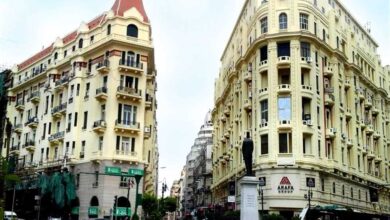The 25 January revolution has resonated with people striving for change around the world – from Egypt’s Arab neighbors to the US state of Wisconsin to, most recently, a popular uprising in Spain against unemployment, corruption and government austerity measures. The revolutionary reverberations came full circle yesterday as dozens of Egyptians and Spaniards gathered in front of the Spanish embassy in Zamalek to show solidarity with protesters in Madrid.
On 18 May, a week before Spanish municipal elections, thousands of Spaniards protested in Madrid’s Puerta del Sol square against massive unemployment, austerity measures, and government corruption. The open-ended sit in has prompted many observers to draw comparisons with Cairo’s Tahrir Square, where protests drove President Hosni Mubarak from power.
In Cairo, some Spaniards are wary of the comparison.
“There is absolutely no relationship between the Egyptian and Spanish Revolution. The Egyptians were revolting against dictatorship, while Spain is already a democratic country,” said Lucia, a Spanish protester outside her country’s embassy in Zamalek who declined to give her last name. “However this is the first time we have seen a sit-in with large number of the population which is similar to the Egyptian Revolution.”
But not everyone protesting in Cairo was so confident in Spain’s democracy. Indeed, the stranglehold on politics by Spain’s two main parties has been an often-repeated complaint of protesters in both Puerta del Sol and Zamalek.
“It is not a complete democracy in Spain,” said Diana, another protester who declined to give her last name. “We want more democracy. We want the politicians to solve the problems of the people. However the politicians until now take decisions on their own and we don’t want that, we want to participate actively in politics.”
Spain’s unemployment rate in is currently at 20 percent, and youth unemployment is at 42 percent. These figures are similar to Egypt, where unemployment was one of many causes that led to the uprising.
The economic policies of Spanish Prime Minister Jose Luis Rodriquez Zaperto have failed to alleviate the effects of the recession that has plagued Spain for the last three years. Moreover, Zapatero’s labor reforms, an increase in the retirement age and cuts in unemployment subsidies, have been deeply unpopular. Now, Spaniards are rising up, Tahrir-style.
“I don’t know if the current demonstrations would take long or not. However I am here to support the people in their demonstrations,” said Lucia. “I’m not against the ideology of the current government yet I see that the government doesn’t think about the people’s welfare.”




